Five years after Essendon was sensationally kicked out of 2013 finals, where are key players in footy’s biggest drama?
FIVE years ago this week Essendon was kicked out of the finals on one of the most dramatic days in footy history. From James Hird to Stephen Dank, we track down 18 of the key players in the AFL’s biggest drama.
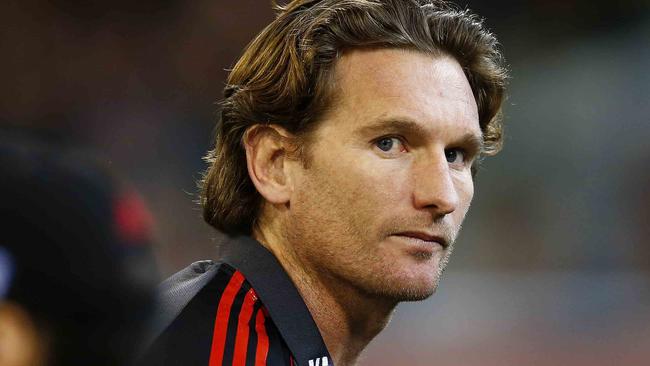
Essendon
Don't miss out on the headlines from Essendon. Followed categories will be added to My News.
FIVE years ago this week Richmond was gearing up for its first finals series in 12 years, but the news was consumed by a very different kind of footy story.
At 8.30pm on August 27, 2013, Mike Fitzpatrick and Andrew Demetriou faced the media and revealed the fate of Essendon club and its officials. The press conference followed three days of tense negotiations at AFL House, and the results were severe.
TOP PICKS: BUCKY’S 30 BEST DRAFT PROSPECTS
$50,000 PRIZE: SUPERCOACH WINNER’S SECRETS TO SUCCESS
Essendon, which had finished the home-and-away season eighth on the ladder, was booted from the finals, fined $2 million and stripped of picks in the 2013 and 2014 drafts over its infamous 2012 supplements program. Coach James Hird was suspended for 12 months, assistant Mark Thompson was fined $30,000 and football manager Danny Corcoran was banned from working with any AFL team for six months.
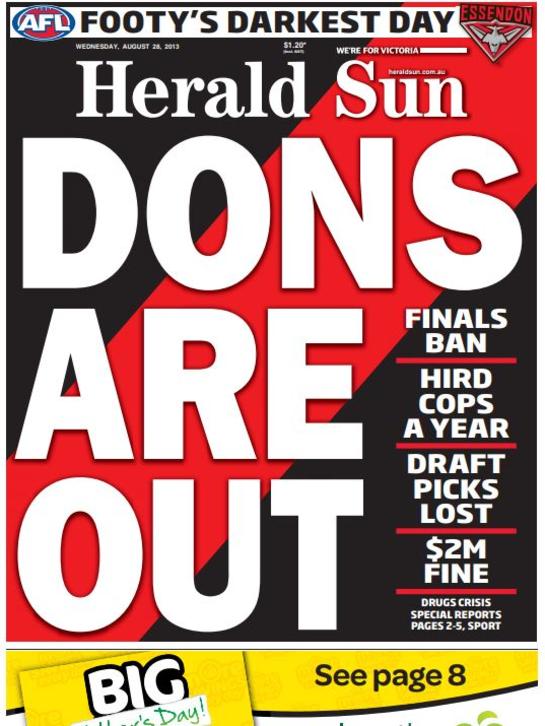
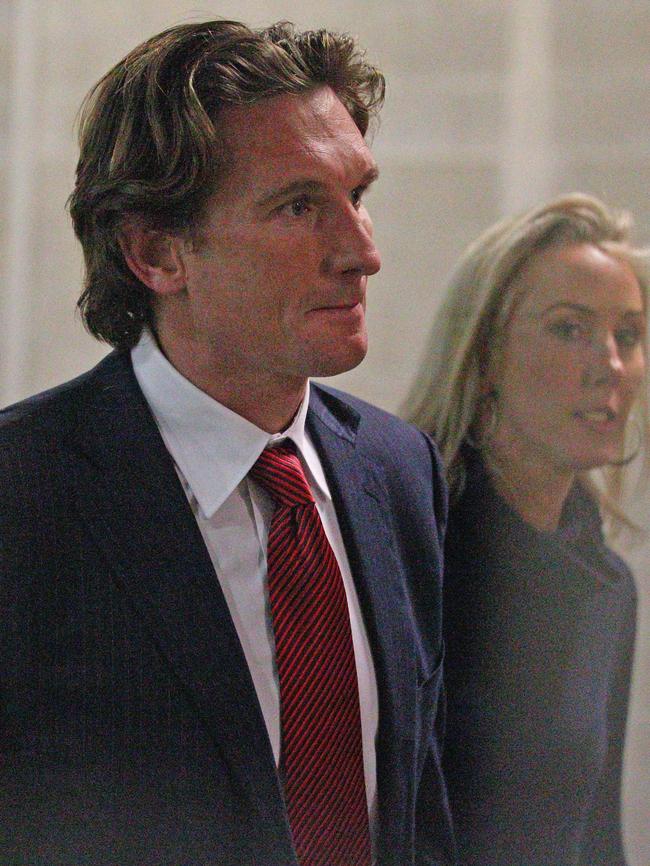
More than two years later, 34 past and present Essendon players were banned for 12 months after WADA, the world anti-doping body, appealed an AFL Tribunal decision to clear them.
The fallout from that night was huge, and the effects still reverberate. Where are the key players now?
JAMES HIRD
Life is finally settling down for one of Essendon’s greats and the central figure in footy’s biggest drama.
Hird spent four months of his 12-month ban in France, where he attended one of the world’s most exclusive business schools. He returned to coach the Bombers but resigned in August 2015 after a 112-point loss to Adelaide.
He unsuccessfully challenged ASADA in the Supreme Court in 2014 and in 2016 lost another court battle with an insurance company over $691,000 in legal bills.
The toll of the years-long saga was revealed in January 2017 when Hird was rushed to hospital after an overdose of sleeping pills, later revealing he spent a life-changing five weeks in a mental health facility.
“Everyone has a breaking point and I reached mine after years of continual stress,” he wrote in a column for the Herald Sun.
“I am not ashamed to say that I needed the care I received and, without it, I do not know where I would be. Depression is more than just sadness.”
Hird has since been welcomed back into the football community. In September last year he presented the Norm Smith Medal to Dustin Martin on Grand Final day. Early this season he turned down an offer to work for the Fremantle Dockers as an opposition analyst.
In May he was the centre of more drama when his Toorak home was broken into and his silver Audi station wagon stolen.
Now 48, Hird now has multiple business ventures — including fine chocolate brand Cacao Hunters — and co-hosts the twice-weekly Crawf and Hirdy Podcast with Hawthorn champion Shane Crawford.
He fiercely maintains his belief that the AFL and ASADA botched the Essendon investigation.
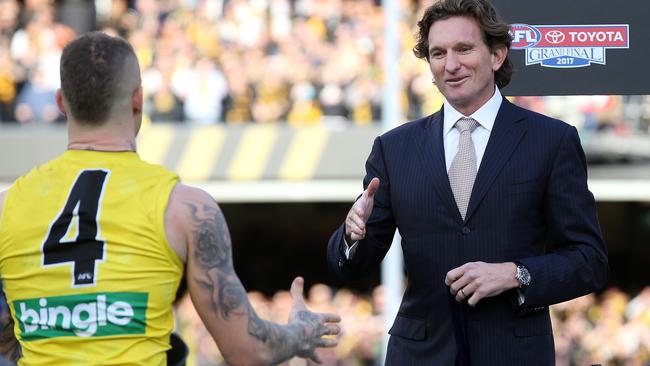
ANDREW DEMETRIOU
Demetriou was chief executive of the AFL when the scandal struck.
He was accused of improperly using information from a confidential crime commission briefing to pressure Essendon into “self-reporting”, a move which triggered the contentious, long-running probe into the club by the AFL and Australian Sports Anti-Doping Authority.
Demetriou stepped down as CEO in June 2014. He lives in Melbourne and serves on a number of boards, including Crown Casino and marketing group Bastion. In May he was appointed co-chair of the NBL’s advisory board.
Last week The Australian reported that the Australian Tax Office has launched a potential investigation into alleged “misappropriation of funds” by Acquire Learning, a failed training broker Demetriou was involved with.
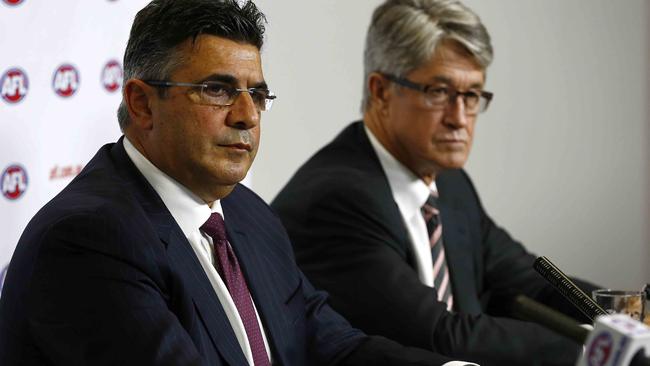
MIKE FITZPATRICK
As AFL Commission chairman, Fitzpatrick read out the Essendon penalties in 2013.
He retired from the role in February last year and was replaced by Richard Goyder, and is enjoying a less public life.
But he was back in the headlines after an appearance on Fox Footy’s Open Mike when he said he was convinced Essendon players had “almost certainly” used performance-enhancing drugs.
When asked if he would now do anything differently with regards to the handling of the saga, Fitzpatrick said “fundamentally not”.
Like Demetriou, he would be keeping his eye on their legacy in expansion clubs Gold Coast and GWS.
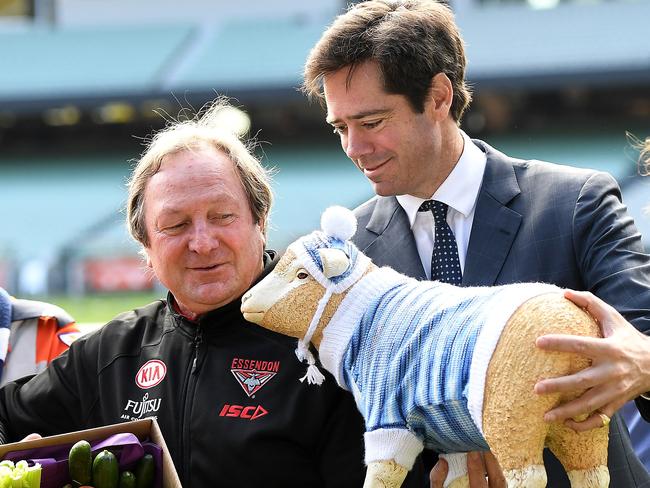
GILLON McLACHLAN
Demetriou’s deputy and chief deal-maker during the saga survived to replace Demetriou as AFL CEO.
As recently as last month was a party to another court case over the saga that was quietly settled out of court.
Met Hird for a surprise meeting at a coffee shop earlier this year when the pair talked about a possible change in a Qantas deal to fly AFL players.
MARK THOMPSON
Facing several drugs charges after a raid on his Port Melbourne home in January.
Thompson was Hird’s assistant coach and stepped up as coach during Hird’s ban in 2014, but in 2015 he said he regretted returning to the club he captained to a premiership in 1993.
Last year Thompson described himself as “bitter and twisted”, said he doesn’t like football any more and blamed the four-year scandal for the breakdown of his second marriage.
He eventually paid his $30,000 fine to the AFL but landed a $7 million property windfall near Geelong.
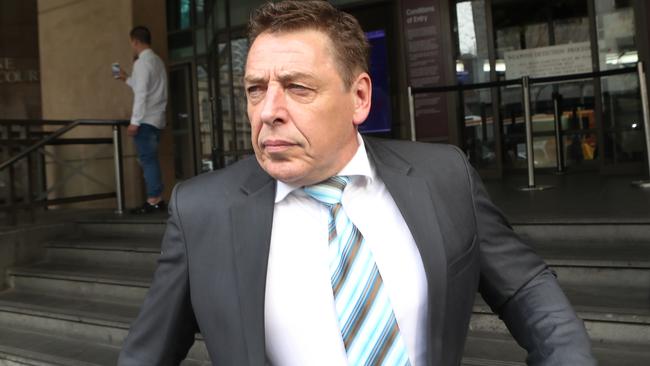
JOBE WATSON
As captain, Watson bore the brunt of the saga on behalf of the Essendon players.
He returned to play in 2017 but retired at the end of the season disillusioned with the game and has shown little inclination to be involved in footy.
He told the Plant Proof podcast this year that the whole saga “makes me sad”.
“I don’t have ill feelings towards the club, but the club didn’t do their job,” he said.
“They were negligent and they were negligent on multiple levels and they had to admit that and I guess my feelings are that it happened, there’s no point harbouring grudges and ill feelings towards the club because of that.”
Watson spends time in New York working as a barista and is expecting a baby with partner Virginia Slaghekke.
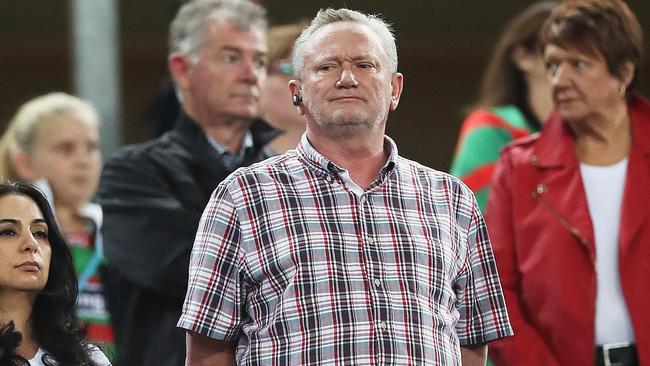
STEPHEN DANK
The architect of the Bombers’ supplements program continues to work in the field of sports science in Sydney despite being handed a life ban from working in the AFL in June 2015.
Dank was being interviewed by the Herald Sun when he learned of the verdict and said at the time: “I have tried to contact AFL boss Gillon McLachlan and left a message warning him that I will be going after him and the Australian Football League in relation to this matter.”
He continues to maintain his innocence and has not ruled out an appeal.
Was the centre of more drama when he was injured during a shooting outside his home in July 2016, later claiming it was a bid to silence him.
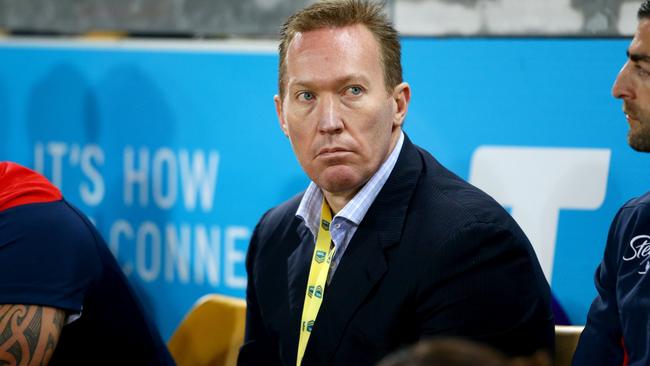
DEAN ROBINSON
Known as “The Weapon”, Robinson was hired as Essendon’s fitness chief in 2011 and recommended Dank to the club.
Despite his role at the centre of the saga he has never been charged or penalised by the AFL or ASADA and recently resurfaced as a fitness consultant to the Sydney Roosters in the NRL.
Collected a $1 million settlement from Essendon after suing the Bombers for wrongful dismissal and threatening the blow the lid off what happened in his time at the club.
His infamous “say it again” interview with Luke Darcy in 2013 became a stumbling block when Channel 7 planned to recruit Hird for its Talking Footy panel this year.
It’s believed working alongside Darcy doesn’t sit well with the former Essendon coach.
BRUCE REID
The case against the long-time club doctor was adjourned the day the penalties were handed down, and charges of bringing the game into disrepute were dropped altogether three weeks later. The next year he was inducted into Essendon’s hall of fame to recognise 34 seasons of service.
Arguably the last man standing from the supplements saga, he is still a senior club doctor.
Maintains that most of Dank and Robinson’s injections program was conducted behind his back.
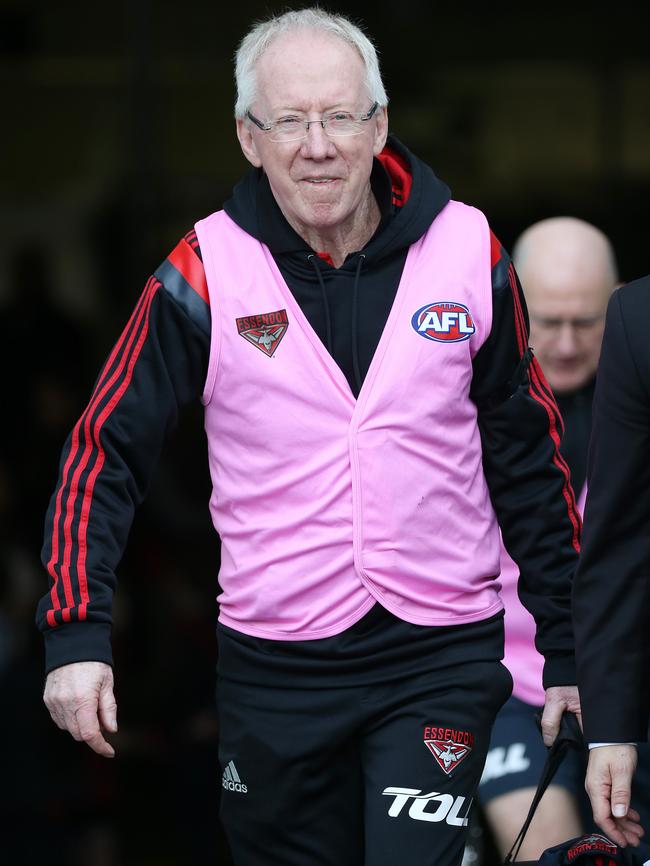
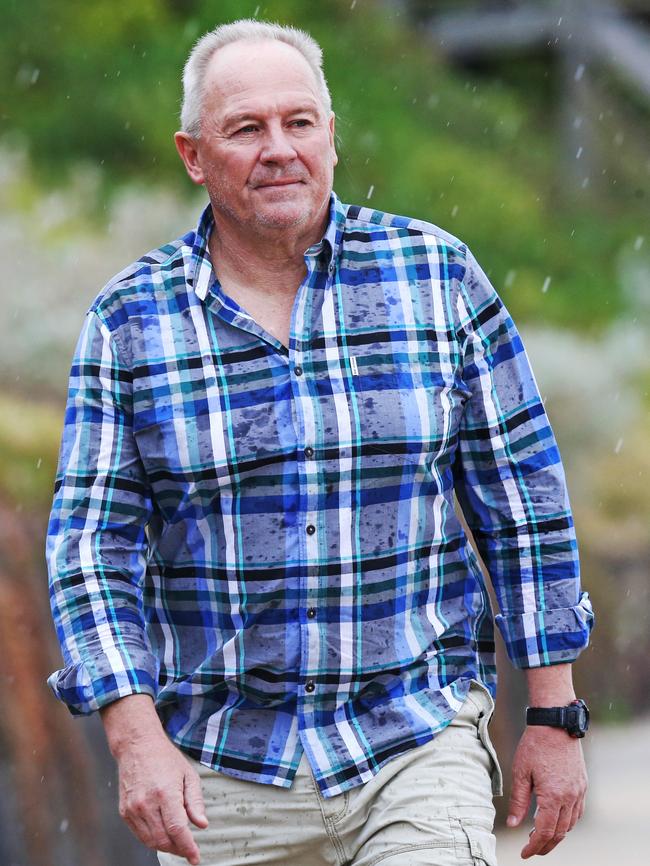
DANNY CORCORAN
The Bombers football manager was banned from working with any AFL team for six months, effectively ending his career in football.
Has not returned to public life but served as president of VFL club Sandringham from 2014-18.
He remains on the Zebras’ board and works in real estate and as a sales consultant for Prince Wine Store in Bayside Melbourne.
DAVID EVANS
Resigned as Essendon chairman in July 2013, describing what happened to the club as “a tragedy”.
He has since concentrated on his investment and wealth management business Evans and Partners, which merged with Dixon Advisory to form Evans Dixon in September last year.
He is on the board of Seven West Media, a member of the Victoria Police corporate advisory group and chairman of Cricket Australia’s investment committee.
Evans spent years developing an exclusive golf course at Cathedral Ridge near Alexandra, designed by Greg Norman, which opened late last year.
The recipient of a phone call from Demetriou that allegedly tipped Essendon off about the scandal, Evans has had limited involvement with the Bombers since 2013.
Early this year Thompson sent him an email pleading with him to come clean about what he knows.
“It’s time to start fighting for the truth for all our sakes, and most importantly for the players’ sake. They deserve to know everything we know about this fiasco. It’s time we all stood up and right the wrong,” Thompson wrote.
“James will die if you continue to let the world bully him. Your former best friend will die fighting for the cause … You need to save my life and that of James Hird, Danny Corcoran, Dr Bruce Reid and 34 current and past players.
“You would save the game in many ways. It’s been a cover-up from the start. And like Watergate, the cover-up is worse than the crime.”
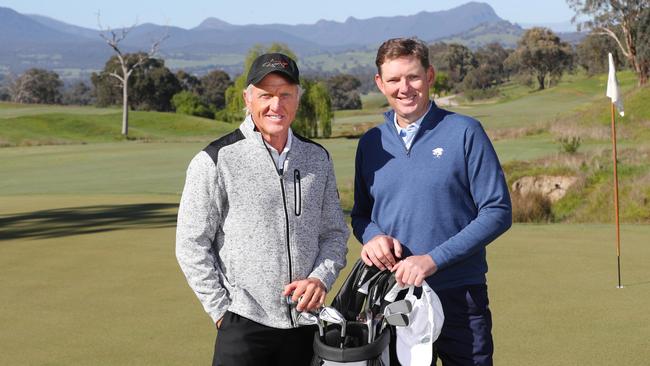
PAUL LITTLE
The billionaire businessman took over from Evans as Essendon chairman in July 2013 as the scandal unfolded.
He stepped down in December 2015 and was replaced by Lindsay Tanner.
Has since been appointed head of Victoria’s major events company and is a leading philanthropist, donating $30 million to Melbourne University in May.
Also owns Little Aviation and has proposed flying AFL teams on his private jets from his hanger at Melbourne Airport, a move Hird has been connected to — and met McLachlan for coffee to discuss.
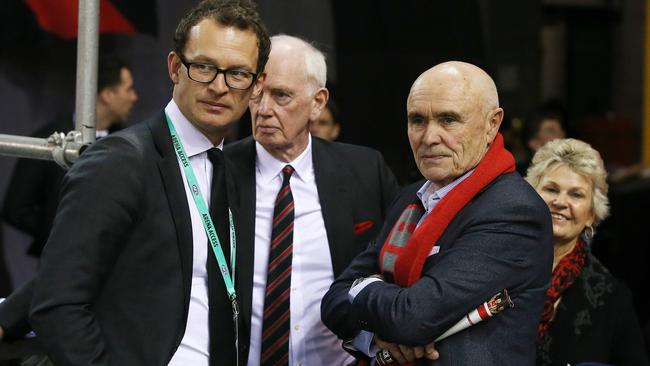
IAN ROBSON
Resigned as Essendon chief executive in May 2013 and landed on his feet as CEO of Melbourne Victory.
Now in charge of Rowing Australia, he has never spoken publicly about the saga but touched on it briefly in an SEN interview last year, saying: “I stand by what I said on the day I resigned — I accepted, if you like, full accountability for what took place on my watch. I resigned. I wasn’t responsible for those actions.”
BEN McDEVITT
The former ASADA boss stood down last year after three years in charge of the Australian anti-doping body. He was replaced by David Sharpe.
Was cleared last year by a Senate estimates committee of accusations by Hird’s father Allan Hird that he lied to the committee about the Essendon probe, saying: “I remain firmly of the view that those in our community who accept that doping is a real threat to sport in our country, also can see that ASADA is not the enemy and that the fight against doping is not a fight against sport”.
McDevitt, who previously spent 28 years in law enforcement, chaired WADA’s independent observer team at the PyeongChang Winter Olympics.
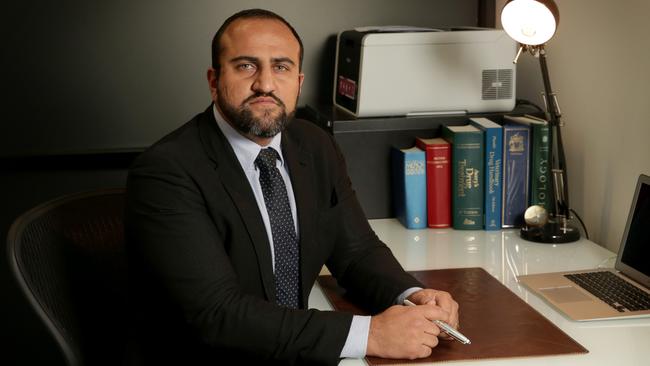
NIMA ALAVI
The pharmacist who gave evidence about his role in the supply of a key substance to Dank. He claims he merely passed on the substance to Dank who was to have it tested.
Anti-doping investigators believed the substance to be the banned peptide TB4 but Alavi denies having any knowledge of this.
Still working at his private practice, Como Compounding Pharmacy in South Yarra, and is managing director of Alavi Group.
SHANE CHARTER
Testified that he sourced the banned peptide TB4 for Stephen Dank while Dank worked for Essendon, but said he did so thinking it would not be used on humans. He initially assisted anti-doping investigators but then refused to give evidence at formal proceedings, weakening their case.
A university-educated biochemist with prior convictions for drug trafficking, Charter still works in the anti-agening business and promotes himself on LinkedIn as “alchemist in search of the elixir of life, happiness and longevity”.
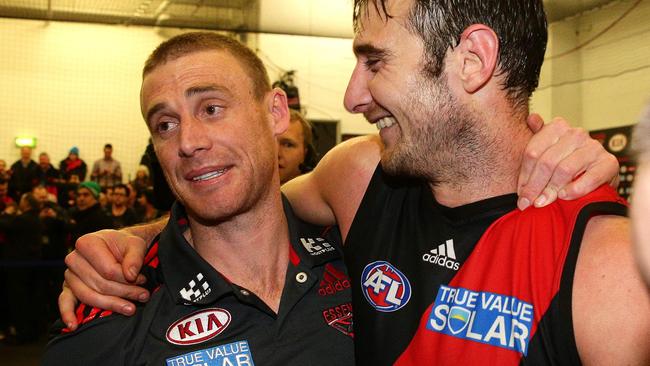
SIMON GOODWIN
One of the Essendon coaches who was injected with the peptide Hexarelin (athletes are banned from using it but coaches are not). He moved on to become assistant coach of Melbourne and took the reins as senior coach in 2017, replacing Paul Roos.
Next week he will lead the Demons into their first finals campaign since 2006.



